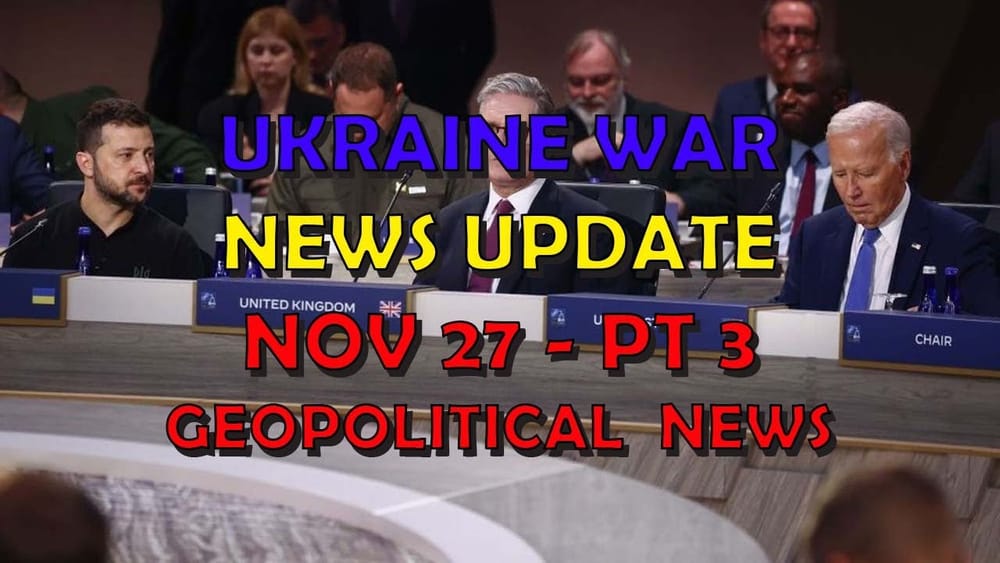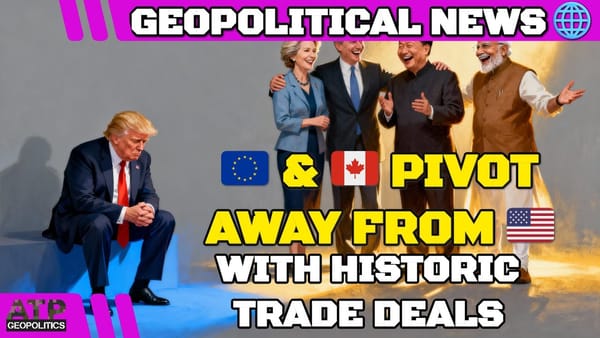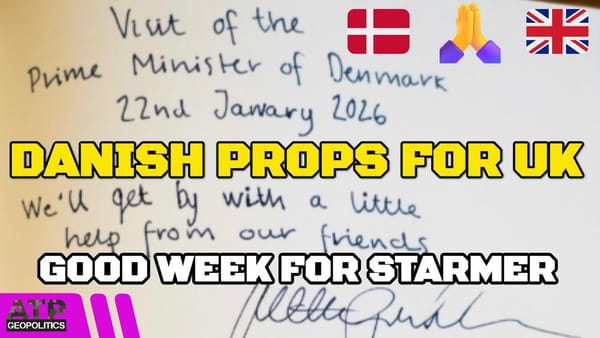Ukraine War Update NEWS: Geopolitical News
Table of Contents 📖
"Russia is seriously trying to cancel the F-35 program by manipulating the narrative, and this is utterly ridiculous."
Hello Team
🎦 00:00-00:08⏩
Jonathan welcomes viewers to another ATP Geopolitics video on the 27th of November 2024. This is the third part of the Ukraine War News Update.
Return to top⤴️
Russian Ruble Collapse
🎦 00:09-00:34⏩
The ruble continues to collapse against the dollar, currently at 112.75 to the dollar. Although it has stalled slightly since an initial drop, the outlook remains negative.
Return to top⤴️
Romanian Presidential Election - Protests against pro-Russian Candidate
🎦 00:36-01:43⏩
- Romania held its first phase of presidential elections, with a right-wing pro-Russian candidate unexpectedly performing well.
- This has sparked widespread concern about potential Russian interference and a shift in Romania's foreign policy towards the East.
- Romanians have taken to the streets in protest, with demonstrations expected to grow in the lead-up to the second round of voting.
- Derek Tainas has been reporting on the situation.
Romanian Presidential Election - Emergency Security Meeting
🎦 01:43-02:03⏩
- Jonathan checks for further updates from Derek Tainas.
- The Romanian President has called for an emergency meeting of the Supreme Council for National Defense. This meeting is focused on security matters.
Romanian Presidential Election - Understanding the Vote for pro-Russian Candidate
🎦 02:05-04:09⏩
- Jonathan returns to Derek Tainas's analysis of the election results.
- It appears the situation might be more complex, or perhaps simpler, than initially thought.
- Many voters for the pro-Russian candidate, Kalin Georgescu, are now expressing regret and claiming they were unaware of his true stance.
- Jonathan highlights the need to read Tainas's full account for a better understanding.
Romanian Presidential Election - Potential Role of TikTok and Disinformation
🎦 04:10-06:01⏩
- Paola Eriza Vanu suggests Georgescu's popularity was driven by similar mechanisms as those used by Ivan Shor's network in Moldova.
- Paid volunteers and Telegram channels were used to promote centralized messages on social networks, as reported by Romanian journalists from G4 Media.
- Jonathan emphasizes TikTok's role in this, as the platform allows individuals to cultivate an online presence without fully revealing their true agenda.
- He notes the effectiveness of negative campaigning, particularly among low-information voters, who might be easily swayed by such tactics.
- He suggests this could be a result of Russian influence operations.
- The CEO of TikTok has been summoned to the European Parliament to discuss the platform's potential role in the Romanian election.
- Jonathan supports this move, asserting that while he is a strong advocate for free speech, the spread of disinformation, particularly from foreign actors, needs to be addressed.
Disinformation as Warfare and the Importance of Combating it
🎦 06:01-09:43⏩
- Jonathan reaffirms his commitment to free speech, referencing his history of writing for platforms like Only Sky Media and Patheos Interfaith Network for the Non-Religious Channel.
- He argues that while he allowed diverse views on those platforms, the current situation with Russian troll farms and bots is different. These are not good-faith actors but are engaged in a form of warfare designed to manipulate narratives and minds.
- He draws parallels to physical and cyber warfare, emphasizing that disinformation campaigns should be treated similarly.
- He argues that regulating such activities is not an infringement on free speech but a necessary measure to combat foreign interference.
- He urges the EU to take a more proactive role in combating disinformation, holding platforms like Twitter accountable.
- He highlights the potential for disinformation to cause chaos in elections, emphasizing the urgent need to address this issue.
Elon Musk and Disinformation on Twitter
🎦 09:43-11:00⏩
- Jonathan acknowledges the importance of positive measures like education to combat disinformation, but stresses their long-term nature and ineffectiveness in the short term. He advocates for more immediate actions to counter disinformation, such as shutting down troll farms.
- He criticizes Elon Musk's handling of Twitter, pointing out his initial concern about bots before purchasing the platform and his subsequent inaction to address the issue.
- He argues Musk's actions have allowed disinformation to flourish, driving users to alternative platforms like Blue Sky.
Romanian Election Update and Abkhazia Protests
🎦 11:00-12:26⏩
- Jonathan expresses hope that the unexpected outcome of the Romanian election might be rectified in the second round if the support for Georgescu was superficial.
- He shifts to a report from the Kyiv Independent about protests in the breakaway Georgian region of Abkhazia.
- He clarifies that the protests, while seemingly aimed at Russian investment in the region, were not overtly anti-Russia. They focused on concerns about Abkhazians being disenfranchised by Russian investors buying up land.
- However, he notes that despite the protests, Russia's control over occupied Abkhazia remains firm.
Gabrielius Landsbergis on Western Support for Ukraine
🎦 12:27-13:31⏩
- Jonathan moves to general geopolitical topics, starting with Gabrielius Landsbergis, the former foreign minister of Lithuania, whom Jonathan admires.
- Landsbergis, in a blunt response, expresses his belief that Western restrictions against Russia came too late.
- He criticizes the West's "managing" strategy, advocating for full-fledged support for Ukraine's victory.
- Jonathan praises Landsbergis's straightforwardness and strong stance on supporting Ukraine.
UK Sanctions against Russia and Russian Response
🎦 13:31-15:43⏩
- Jonathan commends the UK government's strong stance on supporting Ukraine, dismissing a petition criticizing the government's approach as pathetic and likely influenced by foreign actors.
- He highlights the UK's imposition of significant sanctions against Russia, particularly targeting shadow shipping, which has elicited a retaliatory response from Russia.
- Russia has banned several UK individuals, including politicians and journalists, from entering the country.
- Jonathan sees this as a badge of honor, indicating the UK government's effectiveness in challenging Russia.
Russian Ban on UK Politicians
🎦 15:43-16:15⏩
- Jonathan lists some of the prominent UK politicians banned by Russia, including Angela Rayner, Yvette Cooper, Rachel Reeves, Ed Miliband, Wes Streeting, Liz Kendall, Hilary Benn, and Maria Eagle.
- He views the ban as a meaningless PR stunt by Russia.
NATO-Ukraine Council Meeting and Kuleba's Assessment of Putin's Intentions
🎦 16:16-17:02⏩
- The NATO-Ukraine Council convened a meeting in response to Russia's use of the new Oreshnik intermediate-range ballistic missile, which was fired at Dnipro. While the meeting's outcomes are unknown, it signifies continued collaboration between NATO and Ukraine.
- Dmytro Kuleba, Ukraine's former Foreign Minister, asserts that Putin is not interested in a peace deal and believes that Trump could weaken Ukraine's resistance.
- He highlights North Korea's strong support for Russia, contrasting it with the perceived reluctance of some of Ukraine's allies to provide necessary weapons.
- Kuleba states that Zelensky cannot accept a deal that involves ceding Crimea and the Donbass to Russia and abandoning NATO aspirations, arguing that such a move would be unconstitutional and politically detrimental for Zelensky.
Potential Roadblocks to Peace and Trump's Possible Role
🎦 17:02-18:34⏩
- Jonathan analyzes Kuleba's statements, highlighting the potential roadblocks to peace: Putin's lack of interest in negotiations and Zelensky's inability to accept a deal that involves significant concessions.
- He speculates on Trump's possible role, suggesting that his strategy might involve pressuring both sides to the negotiating table through blackmail. However, this approach might backfire if both sides are unwilling to compromise.
- Jonathan notes Trump's relative silence on Ukraine and contrasts it with the pronouncements of figures like Sebastian Gorka. He suggests this silence might indicate that Trump is being briefed on intelligence that could potentially shift his stance on the conflict. He expresses hope that this intelligence will convince the incoming administration to adopt a more supportive position toward Ukraine.
Slovakia's PM Accepts Invitation to Moscow Victory Day Parade
🎦 18:34-19:07⏩
- Slovakian Prime Minister Robert Fico accepted Putin's invitation to attend the Victory Day parade in Moscow in May 2025. Jonathan expresses disapproval of Fico's decision, calling him a "dingbat."
Belarus's Role in Helping Russia Evade Sanctions and Gazprom's Plans for Gas Transit
🎦 19:07-20:40⏩
- Belarusian companies have aided Russia in circumventing sanctions by supplying over $125 million worth of microchips since 2022, including Western-made chips used in military technology. Jonathan calls for closing this loophole.
- Gazprom is planning to cease gas transit through Ukraine after 2024. Jonathan notes the paradoxical situation of Russia profiting from gas transit through Ukraine during the war.
- He welcomes Ukraine's recent decision to halt gas transit to Slovakia and Hungary, ending the contract with Russia. He anticipates Gazprom seeking alternative routes for gas transport.
Update on the Chinese Ship and Severed Undersea Cables in Kattegat
🎦 20:40-21:40⏩
- Jonathan provides an update on the situation with a Chinese ship, captained by a Russian, that potentially severed two undersea cables in the Kattegat Strait, possibly between Lithuania and Sweden, or Denmark and Germany.
- The ship, suspected of involvement in the incident, is being monitored by Danish vessels.
- Jonathan finds the situation intriguing.
Hope for Russia's Economic Collapse and Jackson Hinkle's Pro-Russian Stance
🎦 21:40-23:43⏩
- Jonathan expresses optimism, citing the deteriorating state of the Russian economy as a potential catalyst for its collapse. He acknowledges arguments suggesting Russia's ability to endure the economic strain for an extended period.
- He shifts to Julia Davis's report on Jackson Hinkle, an American YouTuber and influencer who has become increasingly pro-Russian. Hinkle has joined Russian state TV host Vladimir Soloviov during a military fundraising event and has openly expressed support for Russia's victory over Ukraine.
- Jonathan criticizes Hinkle, along with Colonel McGregor and Scott Ritter, as "despicable human beings" who have revealed themselves to be pro-Russian "shields."
- He warns against Tulsi Gabbard and Mike Flynn, whom Hinkle supports, citing their pro-Russian stance and potential threat to US national security if they assume positions in the incoming administration.
China's Exploitation of Russia's Economic Weakness
🎦 23:45-28:42⏩
- Anton Gerashchenko highlights China's strategic exploitation of Russia's economic woes. He describes the relationship as a "friendship on paper" that masks a quasi-colonial dynamic.
- China benefits from access to cheap raw materials and a market for its surplus goods, creating a dependence on Chinese manufacturing and economic power.
- Russia, weakened by sanctions, is increasingly reliant on China.
- This extends beyond oil and gas to other resources, including gold. Russia, the world's second-largest gold producer, is using its reserves to barter for goods, circumventing sanctions.
- Jonathan provides a simplified explanation of money as a substitute for bartering and highlights the US dollar's role as a universal currency. He notes Russia's failed attempts to create an alternative currency system with BRICS.
- China has become a hub for Russian gold, potentially refining and laundering it to evade sanctions.
- Exports of Russian diamonds to China via Hong Kong have also surged, with indications that China might be processing and reselling them to Russia.
China's Strategic Advantage in the Russia-Ukraine War
🎦 28:42-29:01⏩
- Jonathan reiterates his long-held view that China benefits regardless of the war's outcome. If Russia loses, China can exploit its weakened position to acquire resources and expand its influence. If Russia wins, China can leverage its support during the war to further its own interests, particularly through initiatives like the Belt and Road Initiative.
- He emphasizes China's strategic advantage in this "heads we win, tails you lose" scenario.
China's Concerns Over Declining Influence on Twitter
🎦 29:03-32:16⏩
- Dean Blundell reports on China's concerns over Elon Musk's management of Twitter. Chinese state media is reportedly worried that Musk is not doing enough to enable the spread of their propaganda in North America.
- Jonathan traces the source of the information to Semafor and Yahoo News. He highlights the exodus of users from Twitter to Blue Sky, a decentralized platform with moderation and a harder-to-manipulate algorithm.
- Chinese state media, which has invested heavily in building influence on Twitter through ads, bots, and influencers, is seeing its efforts thwarted by the platform's declining user base.
- Jonathan contrasts Blue Sky's decentralized structure and moderation with Twitter's susceptibility to manipulation under Elon Musk's control. He discusses the platform's funding prospects, noting that it's likely to attract significant investment. He raises questions about potential strings attached to such investment and the platform's long-term sustainability.
- He concludes that China's influence operations on Twitter are being hampered by the user exodus to Blue Sky, where manipulation is more difficult. He speculates that Russia likely faces similar challenges.
Concerns Over Trump's Cabinet Picks and Potential Economic Chaos in the US
🎦 32:20-39:56⏩
- Jonathan expresses concern over the lack of US news and the questionable picks for Trump's cabinet, many of whom are mega-donors with no relevant experience.
- He highlights the nomination of John Phelan, an art collector and private equity firm owner, for Secretary of the Navy despite his lack of military background.
- He criticizes the trend of appointing wealthy individuals to positions of power, suggesting it risks turning the US into an oligarchy. He questions the potential for quid pro quo arrangements and corruption. He cites Elon Musk's wealth increase following Trump's victory and his subsequent government contracts as an example of this potential for conflicts of interest.
- Jonathan advocates for a technocratic approach, where experts are appointed to positions based on their qualifications and experience. He contrasts this with Trump's seemingly arbitrary appointments, raising concerns about the competence of the incoming administration.
- He connects these concerns to his earlier warnings about potential economic chaos in the US under Trump's policies. He acknowledges the current strength of the US economy but argues that Trump's protectionist and anti-immigration policies could undermine these fundamentals, leading to inflation, trade wars, and economic instability.
- He highlights the appeal by US farm groups to Trump to exempt their workers from deportation, illustrating the potential unintended consequences of his policies.
- Jonathan expresses skepticism about the economic rationale behind Trump's decisions, suggesting they are driven by social and cultural motives rather than sound economic principles. He draws parallels to Brexit, arguing that while immigration control might be achieved, the economic consequences will be negative.
- He concludes that those who voted for Trump based on economic considerations might be disappointed, predicting potential economic chaos under the incoming administration. He cites the combined wealth of Trump's cabinet, estimated at over $313 billion, as an indicator of the administration's focus on wealth and corporate interests rather than the needs of ordinary Americans.
Elon Musk's Influence on Military Procurement and the F-35 Program
🎦 39:56-41:16⏩
- Jonathan shifts to a concerning development regarding Elon Musk's potential influence on military procurement. He expresses concern over Musk's involvement in military decision-making, citing his previous criticism of the F-35 program.
- He shares a tweet from Wall Street Mav, a prominent Twitter user, urging "Doge" (Musk's nickname for the Department of Government Efficiency) to cancel the F-35 program, arguing that drones can perform the same tasks more cost-effectively.
- Jonathan criticizes this claim as empirically false and expresses worry over Musk's apparent alignment with those seeking to scrap the F-35 in favor of Starlink-controlled drones.
Thin Republican Majority in Congress and Implications for Ukraine Aid
🎦 41:16-44:24⏩
- Jonathan analyzes the makeup of the US Congress, emphasizing the thin Republican majority and its implications for passing legislation, particularly regarding Ukraine aid.
- He acknowledges Trump's wide but thin victory in the presidential election, noting the narrow margins in several swing states.
- He points out the slim Republican majority in the Senate and the even tighter majority in the House of Representatives, where a shift in a single California seat could create a razor-thin margin, leaving little room for defections.
- Jonathan suggests that passing pro-Ukrainian bills will be challenging, even if they reach the floor, due to the tight majorities and the influence of Trump loyalists like Speaker Mike Johnson.
- He concludes that while there might be enough votes in both houses to support Ukraine, getting legislation passed will be a difficult process.
Wrap Up
🎦 44:24-44:30⏩
Jonathan encourages viewers to discuss these topics in the comments section. He then thanks his audience for watching and signs off.
Return to top⤴️



